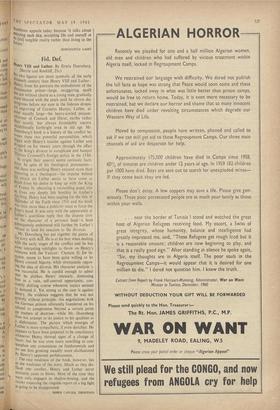Fid. Def.
Henry VIII and Luther. By Erwin Doernberg. (Barrie and Rockliff, 21s.) full ;haft'
titute
oned than
d so mis-
ey're
set- tract ple's it in lings
:Olaf
here will
bout 1.iny but
ti in
tlish
tion
on ere- de- C. 3 1,l° two figures are more symbolic of the early 1,1xlcenth century than Henry VIII and Luther : r,slenry, from his portraits the embodiment of the !cenaissance prince—large, swaggering, spoilt but not without charm as a young man, gradually more bloated with the years until he almost dis- integrates before our eyes in the hideous dropsi- cal engraving of Cornelys Matsys; Luther, al. most equally large—the heavy-jowled peasant- reformer of Cranach and Direr, earthy rather than saintly, but always formidably sincere. LIriinhibitedly forthright even in old age. Mr. ueernberg's book is a history of the conflict be- t\ een these two powerful personalities, which began with Henry's treatise against Luther and 'lagged on for twenty years through the affair of the King's divorce to complicate and hamper Thomas Cromwell's foreign policy in the 1530s. In origin their quarrel seems curiously facti- tious. In spite of his theological pretensions-- and there was nothing Henry enjoyed more than Pomuring as a theologian—the impulse behind his attack on Luther seems to have come as much from his desire to keep up with the King el France by obtaining a resounding papal title as from any deeply felt hostility to Luther's teaching. Henry had been angling for the title of befender of the Faith since 1516 and his book Was little more than a publicity stunt to force the t'epe's hand. It was only with the appearance of Luther's scurrilous reply that the dispute took on the character of a personal feud—a feud subsequently embittered still further by Luther's refusal to lend his sanction to the divorce.
Mr. Doernberg has put together the pieces of 11,e story with skin. He is at his best when dealing kith the early stages of the conflict and he has sonic interesting sidelights to throw on Henry's relations with the Vatican: Clement II. for in- stance, seems to have been quite willing to let Henry commit bigamy, while strenuously oppos- ing the idea of divorce. His character analysis is less successful. He is candid enough to admit that he dislikes Henry intensely, dismissing him as a vain, self-centred opportunist, con- stantly shifting course whenever tactics seemed le demand it. Yet strong as the case is against Henry, the evidence suggests that he was not ertirely without principle--his negotiations with the German princes ultimately foundered on his refusal to compromise beyond a certain point Oh matters of doctrine—while Mr. Doernberg does not attempt to do justice to his qualities as a diplomatist. The picture which emerges of Luther is more sympathetic, if even sketchier. He appears to have been prepared to be conciliatory Whenever Henry showed signs of a change of heart; but he was even more unwilling to con- template any concessions on fundamentals and v'e see him growing steadily more disillusioned 14 Henry's apparent perfidiousness. The real weakness of the book, however, lies In the weakness of the story. Much as they dis- liked one another, Henry and Luther never seriously came to blows. Most of the time they were only engaged in shadow-boxing, and the reader expecting the ringside report of a big fight is going to he disappointed.
JAMES CARGILL THOMPSON






































 Previous page
Previous page